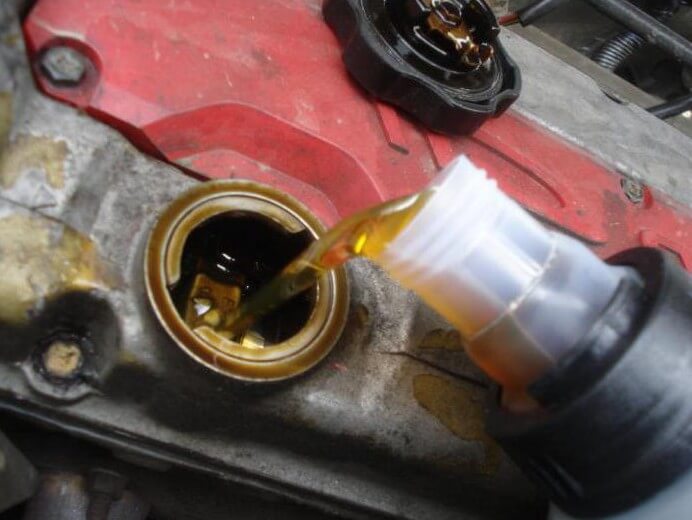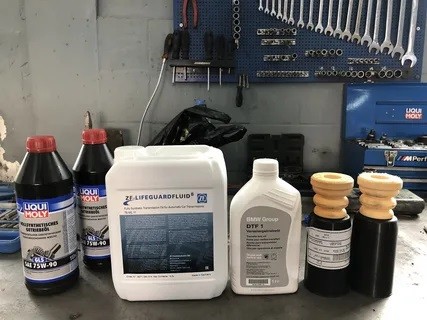
Synthetic Oil: Should You Switch From Conventional to Synthetic?
Content
- Why is synthetic oil better than conventional oil?
- What is the role of oil in an engine?
- History of synthetic oil: when and why was it created?
- What is the difference between fully synthetic oil and regular oil?
- Why is synthetic oil better for your car than regular oil?
- What synthetic oil does my car need?
- Should I convert my car to synthetic oil?
- Switching from synthetic oil to conventional
- Which brand of oil makes the highest quality synthetic oil?
- Prices for synthetic and conventional oil in 2020
- Synthetic oil change coupons
- How can I make sure I have the best oil for my engine?
Benefits of a fully synthetic oil for car engines.
Ironically, many car owners spend thousands of dollars on car repairs, saving on the cheapest but most important aspect of car maintenance: changing the oil.
More than half of U.S. car owners use conventional or synthetic oil, according to Consumer Report auto maintenance experts. In other words, over 50% of vehicle owners are missing out on the benefits of full synthetic oils: longer engine life, less wear on engine parts, and longer service intervals, since synthetic oils typically need to be changed once a year. 6 months instead of once every 3 months for conventional oils.
Because most car owners trust their mechanics to change the oil, they usually don't consider the type of oil they put into their cars. Many car owners choose to save money by choosing regular oil over synthetic oil for an oil change, unwittingly setting the stage for more expensive car repairs down the road, resulting in sludge buildup. However, when car owners become aware of the value of synthetic oils for their engines, they decide to switch to them to ensure the health and longevity of their car's engine.
Why is synthetic oil better than conventional oil?
Synthetic oil is produced in laboratories using distilled crude oil and artificial, chemically modified materials. According to Car and Driver, each manufacturer has its own proprietary formula with additives that improve engine performance in various ways.
According to an independent review by The Drive, the leading synthetic brands, rated for their viscosity, strength, and lubricity, include Valvoline, Royal Purple, and Mobil 1. While all three brands of synthetic oils reduce engine deposits and extend oil change intervals, oil Mobil 1 ranked first for its anti-wear properties in both extreme cold and high temperatures. The brand is also popular with luxury brands and professional race car drivers for its combination of cleaning and performance enhancing additives.
Mobil 1 uses patented anti-wear technology that exceeds the standards set by leading Japanese, European and American car manufacturers. Their formula provides protection against engine wear, extreme heat, cold and difficult driving conditions. The company's proprietary blend promises car owners that their engines will stay like new by more efficiently lubricating engine parts and maintaining their integrity in extreme temperatures that can oxidize and cause oil to thicken, which in turn makes it difficult to pump oil. engine, ultimately reducing engine efficiency by wearing out the engine.
What is the role of oil in an engine?
Engine oil lubricates, cleans and cools engine parts while reducing wear on engine components, allowing engines to operate efficiently at controlled temperatures. By changing your oil to a high quality oil at regular intervals, you can reduce the need for future repairs by reducing the friction of engine parts. Oils are made from petroleum or synthetic (non-petroleum) chemistries, i.e. conventional or synthetic blends using hydrocarbons, polyintrinsic olefins and polyalphaolefins.
Oil is measured by its viscosity or thickness. The oil must be thick enough to lubricate the components, yet thin enough to pass through galleries and between narrow gaps. Extreme temperatures - high or low - can affect the viscosity of an oil, reducing its effectiveness more quickly. So choosing the right oil for your car is like choosing the right blood type for a transfusion - it can be a matter of life and death for your engine.
If an engine is compatible with both synthetic oil and regular oil, then using regular oil is practically a crime against your car, says Chief Mechanic Boddy T. Synthetic oil is far superior to regular oil, according to an independent evaluation by the AAA. because it offers vehicles significantly better engine protection, allowing car engines to run longer, perform better in traffic jams, tow heavy loads and operate in extreme temperatures.
History of synthetic oil: when and why was it created?
Synthetic oil was developed in 1929, about three decades after the invention of gas-powered cars. Since the 1930s, synthetic oils have been used in everything from conventional cars to high performance cars and jet engines. According to Car and Driver Magazine, during World War II, when Allied forces restricted oil supplies to Nazi Germany, the embargoed country used synthetic oil to fuel German army vehicles. In the 1970s, the American energy crisis led to efforts to create better synthetic oils to improve fuel economy. Today, synthetic oils are being used in both high-performance vehicles and conventional engines as car manufacturers strive to improve fuel efficiency.
What is the difference between fully synthetic oil and regular oil?
Conventional petroleum or conventional oil is obtained from crude oil or fossil fuels. It consists of a mixture of hydrocarbons, nitrogen, sulfur and oxygen. Refineries heat crude oil to the temperature needed to turn it into functional motor oil for oil replacement.
Synthetic oils are created through complex processes as they are developed from petrochemicals and require precise molecular formulations that remove impurities from crude oil and the molecules are tailored to meet the requirements of modern engines.
Why is synthetic oil better for your car than regular oil?
As conventional and blended synthetic oils degrade, their ability to prevent engine wear tends to decrease. Oil tends to pick up deposits as it circulates and lubricates engine parts for the thousands of cycles that car parts must perform per minute.
Compared to fully synthetic oils, conventional oils end up depositing in the engine and reducing engine efficiency, slowing it down and shortening its life. Think of the sludge that is gradually produced in ordinary oil as cholesterol inside the arteries, slowly impairing blood flow and eventually causing systemic problems in the body. The reason most vehicles use synthetic oils is because they are better for performance, engine durability, hot/cold conditions and heavier towing.
What synthetic oil does my car need?
New high-performance vehicles usually use synthetic oils, but it's important to know which type of oil your engine will run optimally on, as there are four types of oils: regular (or regular), synthetic, blended synthetic oils, and high mileage oil.
Synthetic blends are a blend of conventional and synthetic base oils that provide higher performance than conventional oils but are not as high quality as fully synthetic oils. Some drivers may want to switch to high mileage oils when their car has traveled 75,000 miles or more to keep their engines performing. It is important to check your vehicle owner's manual because the optimal types of oils differ depending on the make, model and engine of your vehicle. Car owners who wish to switch from conventional to synthetic oil should consult with their mechanics and read the information they need to make the transition.
Should I convert my car to synthetic oil?
Most cars made in the last decade use synthetic oil. However, just because you've been using regular oil throughout the life of your vehicle doesn't mean you can't switch to synthetic oil. The benefits of switching to synthetic oil include better performance as well as longer oil change intervals since synthetic oil wears out more slowly than conventional or regular oil. According to the AAA, switching from conventional to synthetic oil will cost the average car owner about $64 more per year, or $5.33 more per month, if the factory-recommended oil change schedule is followed.
Switching from synthetic oil to conventional
However, one caveat. If you decide to switch to synthetic oil, it is not recommended to go back to regular oil, as this can harm your engine. And if your car isn't designed for both synthetic and conventional oil, then switching can create problems with your engine to the point where it starts burning oil as it enters the combustion chamber and burns out. A qualified mechanic will be able to help you make the transition if it benefits your vehicle.
Which brand of oil makes the highest quality synthetic oil?
Mobil 1 1 Synthetic Motor Oil 120764W-5 is the most stable and superior synthetic oil over a wide range of oxidation states and temperature fluctuations, according to experts from both The Drive and Car Bible, offering optimum operating conditions in hot and cold conditions. cold state. weather protection. The oil offers: excellent viscosity control, a fully advanced synthetic formulation, oxidation and thermal stability, and improved frictional properties. That's why performance car owners and even NASCAR drivers choose Mobil 30 for the race track, notes Car Bibles.
Prices for synthetic and conventional oil in 2020
The main factors driving car owners to use regular oil is the price and the lack of access to information about the value of quality oil. The main price difference between conventional and blended oils compared to fully synthetic oils is price and formula. Blended and regular oils typically cost less than $20 per 5 liters and come in a variety of blends to choose from. Full synthetic is premium and typically costs around $45, while a regular oil change averages $28. However, given that synthetic oils need to be changed less often, you can end up saving money in the long run as you need about two synthetic oil changes a year instead of four conventional oil changes.
Synthetic oil change coupons
For car owners looking for synthetic oil change coupons, numerous lubricant chains offer coupons for a variety of oils, including synthetic oils. Each month, lubricant chains such as Jiffy, Walmart, Valvoline, and Pep Boys issue numerous coupons for synthetic oil changes, as well as blended and regular oil changes. You can find an updated list of the best oil change coupons here, just be sure to call the store first to make sure the coupon is valid. It may also be wise to call ahead to make sure the OEM recommended oil is used when changing lube oil, because some quick release lubricants only keep a few oils on hand.
How can I make sure I have the best oil for my engine?
Before signing up for an oil change, you can find exactly the oil your car needs on AvtoTachki in less than a minute. AvtoTachki's mobile oil change starts with a transparent offer that will show you what kind of oil you can expect in your engine. Mechanics use exactly the oil recommended by the OEM recommendations (no bait or switch, and no recycled or reused oils), and customers get an analysis of their car's condition with a 50-point inspection that pinpoints what car owners should be on the lookout for. line - from oil changes to brakes and complex engine safety issues.
